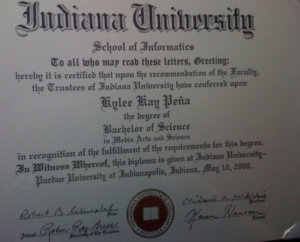Graduating into Uncertainty: Some Encouragement for 2020 Media Program Grads
So you’re graduating into a pandemic and a recessed economy. Hoo boy. As a Spring 2009 media program graduate, I have a feeling what’s going through your head right now and yeah, it’s not great is it? I’m sorry about this timing. It sucks.
 When I graduated in 2009, the economy was tanking. We could see it coming like some kind of slow-moving train wreck throughout our senior year. The housing bubble burst and media jobs as we knew them were evaporating, with job descriptions being completely re-written. Postings that would have been appropriate for entry level were being targeted and filled by mid-career professionals – for entry level pay, so we were all equally screwed. To top it off, the H1N1 pandemic was lurking in the background. We were lucky though. It never came close to the impact COVID-19 is having, but we weren’t allowed to shake hands on stage at graduation. (I remember the brief conversation around if commencement would even happen, but it was just rumors. To live through the end of my senior year in COVID is not imaginable to me.)
When I graduated in 2009, the economy was tanking. We could see it coming like some kind of slow-moving train wreck throughout our senior year. The housing bubble burst and media jobs as we knew them were evaporating, with job descriptions being completely re-written. Postings that would have been appropriate for entry level were being targeted and filled by mid-career professionals – for entry level pay, so we were all equally screwed. To top it off, the H1N1 pandemic was lurking in the background. We were lucky though. It never came close to the impact COVID-19 is having, but we weren’t allowed to shake hands on stage at graduation. (I remember the brief conversation around if commencement would even happen, but it was just rumors. To live through the end of my senior year in COVID is not imaginable to me.)
I’m not going to begin to draw direct comparisons to say I had it just as badly as you did. I think you’ve got the worse deal now by far. After four years, you can’t even celebrate your achievements with so much as a brunch with friends. Many of you had your senior projects derailed completely. I watched a number of student capstone presentations virtually which was really cool but also weird. We’re all stuck inside, watching the country argue over something as simple as wearing a mask. The entire film and television industry is shut down. Nobody has any real idea of when things will be safe enough to resume work, and nobody believes things will ever truly go back to what they were before the pandemic began. You’re entering the workforce when the majority of that workforce has more questions than answers for you.
When I saw the writing on the wall for the economy at the end of my senior year, I went to a career counselor at my school. He laughed and told me to go to grad school. I am not passing this advice to you unless grad school fits your career path as you see it now. I’m adding this just to remind you that the established adults in your life can be unhelpful idiots too.

I was really lucky when I graduated because I had found a job through a former student. It was a video producing job in an industry that thrives when the economy drops and people get desperate: trucking. I had an opportunity to work on my skills and my network while I had a 9-5 job producing corporate videos. I hope all of you have this kind of luck and opportunity soon.
It’s a bummer of a time to be transitioning from one stage of life to another. If you’re anything like me, you have been impatiently waiting for that degree to get conferred so you can get to the real work and live your life. But now the world is paused.
As someone who graduated into a strange time with a terrible economy, I feel like I have a uniquely parallel experience that might be able to help you a little. You will come out the other side of this having learned so much more that you’ll be able to pass on. But I hope in the mean time, this offers you some comfort, encouragement, and real practical advice you can act upon.
1. Keep Learning

If you haven’t already gotten this advice, I’m surprised. It’s one of the pieces of advice I’ve gotten the most, and it’s one that’s been the most applicable, even if it’s annoying to hear over and over. You have spent a lot of time and money in college learning a variety of topics, but most of all you have been learning how to learn. Now you need to adapt that to your new non-student life. You have to keep learning new software, skills, tools, approaches, and technologies. If you stop learning, you’re going to flounder.
You even have work to do right now. You need to meet people who are doing jobs you want and find out what college missed for you. Then you need to go learn that. Balance learning with resting and being kind to yourself, but do keep actively learning.
2. Don’t Wait for Permission to Share your Knowledge

Almost as soon as I graduated, I started writing a blog. I wrote about things that interested me. I dissected TV shows. I started a series of blogs where I bitterly wrote about learning the things college didn’t teach me (see step one!). I shared this on social media and Creative COW and everywhere else. It got my name out there, and then when I met people in real life they knew me from my blogs. Even if it hadn’t had that impact, it helped me to organize my thoughts, learn and evaluate stuff, and level up on technical writing which I use a ton now.
Just because you are new doesn’t mean you don’t have something to teach. If it’s not blogging, it could be posting tutorials or movie reviews. It could be helping people on a forum or Facebook group. It could even be mentoring someone younger than you remotely. Young people have more access to creative tools than ever. And let’s face it, ya’ll know how to get your stuff out there way better than I do: I’m just telling you to DO it and do it in a professional capacity! Don’t wait for an invitation or to be more “qualified”.
3. Pace Yourself

By the time I graduated, I had applied to hundreds of jobs and maybe gotten a response from 3 or 4. Looking for work is work. Looking for internships is soul-sucking. After I was at the job I got upon graduation in Indianapolis, I really wanted to move onto something else and somewhere else. I applied for hundreds more. It was exhausting and humiliating to work in a horrible economy where terrible jobs were going to people ten years my senior. It felt terrible to dislike a job I had in my field when almost nobody else had a job at all, but I’m allowed to have feelings. And this industry was really taking advantage of desperate people in a down economy, which was awful for morale.
In one case, I got an interview at a post facility in Chicago. They offered me a tape operator position for $10/hr, and said they would graciously train me on how to do the job. “Nobody else would hire you and train you. The only other place in town is Harpo [Oprah’s production company] and they only hire experienced professionals.” Another time, I was flown across the country for an interview in Phoenix at a major tech company. It was an absolute gauntlet and the producer gave me tips that implied I would certainly get the job. Once I was rejected, it took a loooong time to recover from that.
By the time I finally made it out – four years into that first corporate job – I was miserable and depressed. I was making terrible wages, doing loads of free work for Indies, and going absolutely nowhere. And that is no way to live. I really needed to find a way to pace myself and care for myself, but it was really hard because the momentum of my ambition couldn’t be stopped. I was so burned out, I was considering leaving the industry for a bit to reset. Don’t let it get to that point.
4. Set Yourself Up for Success Financially
The biggest secret to success in entertainment (aside from being born into a rich family or inheriting a trust fund) is to absolutely live below your means as early as you can and for as long as you can. Start saving early and as much as possible. Having a cushion allows you to take risks when others cannot, and it keeps you afloat when crazy things happen – like a writer’s strike or a pandemic. If at all possible, live with your parents or multiple roommates. If you plan on moving to another city, save up and couch surf as much as humanly possible. And don’t wait to make big changes until you’re super comfortable in your life.
This is really hard to accomplish for a lot of people. The less privilege you’ve got in life, the harder it’s going to be. But in small ways, it is possible. This doesn’t mean skipping Starbucks and other stupid meaningless advice. It means prioritizing different things at different times with full intent behind it. It means making decisions that incur risk or some discomfort so that in 5 years, you won’t even have to think about it.
How do you do this during a pandemic? That’s really up to you. It might be impossible right now if you’re unemployed. But it could mean rescheduling your big move to a new city or putting off leasing your own apartment or investing in a new car. It could mean picking up a retail job. It could also mean just having patience and doing loads of planning and research so you know exactly what to do when the opportunity presents itself.
5. It’s Okay to Take a Break, and it’s Okay to Work Other Jobs
Right now, you might find yourself as a bachelors degree holding retail worker. And you know what? THAT IS OKAY. It is always okay to work a job that isn’t in the scope of your desired career path. Not every single thing you do has to be considered some measurable step forward. Sometimes just surviving each day is enough. You need to do what makes you happy and fulfilled, and these days that definition is changing. Even after the pandemic, what fulfills you might simply be having enough money in your checking account to cover your rent.
Of course, I do hope that you get everything you want. I hope you get your dream job and salary, and that it brings you protection and a secure future. If you end up in a job you dislike or that isn’t on your path, please internalize this: this is temporary and it’s a necessary step toward security and happiness.
6. Don’t Hold Yourself to a Timeline or a Plan

I am a planner. When I was 20, I made a ten year plan. Then the recession happened. Whoops, stuck on step two forever. Word of advice: don’t do this to yourself. Have an idea of where you want to go, but be flexible! Learn about all the other jobs in the industry. Particularly right now, production and post will be changing to adapt to more virtualized or remote work. The job you think you want now might end up radically different in 5 years. Jobs you never considered might end up meshing closely with post production. Keep your eyes open and observe how the world is changing. Meet lots of people and ask them about their jobs and paths.
I’m currently doing a job that didn’t really exist when I was in college. Certainly when I graduated, the company I work for had quite a different business model. Keep your eyes open and keep a pulse on what really drives you and your career. Establish these habits early.
7. Ask for Help
I have never been good at asking for help. And I’m telling you, almost everything would have been easier on me if I had asked, or asked earlier. I went through some pretty heavy stuff in my move from Atlanta to Los Angeles, and I was solitary and quiet about it. I reached out to very few people. If I hadn’t I would have combusted. After I had gotten through it, I wondered why I hadn’t just reached out to local friends to ask for shelter and a kind word. They would have absolutely been there for me in a heart beat.

You have people like that in your lives too. Right now, we’re all feeling really off. You might be feeling sad or overwhelmed or lacking closure from your senior year just evaporating. You might be grieving illness or lost opportunities or the unknown. That’s okay.
Share that with your friends and family. Find someone to talk to about your worries. Share fears and hopes. Get that off your chest. If you need more than that, there are other options for professional assistance. For example, in LA you can get access to the app Headspace for the rest of the year for free.
Class of 2020 Media Students: I’m sorry your careers are starting off with an industry-altering global pandemic. I’m sorry if you’ve lost loved ones. I’m sorry if you’ve lost opportunities or the chance to just rest after a grueling 4+ years. I’m sorry the world is a mess right now.
But if anyone can bounce back from this, it’s you. You were all born into a world where computers were everywhere. Your first real cell phones were probably capable of recording HD minimum video. YouTube was already a huge thing by the time you were allowed on the internet alone regularly. NLEs were affordable or free. Education and tutorials were plentiful. You are possibly the most socially responsible, globally minded, human-focused generation that has graduated so far.
In the face of change and the unknown as it applies to entertainment technology, content creation, and storytelling, you are the most likely to succeed. You are going to help build and shape the future of cinema, television, small screens, and big screens. You can and will do work differently, and I can’t wait to see what you create.